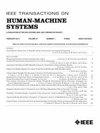Individual Performance in Women's Grassroots Football: A Physical and Emotional Perspective
IF 4.4
3区 计算机科学
Q2 COMPUTER SCIENCE, ARTIFICIAL INTELLIGENCE
引用次数: 0
Abstract
It is essential to monitor and follow up with athletes, both from the point of view of physical and emotional well-being. This allows optimizing the strategy to be followed to achieve full individual and collective development, thus resulting in an improvement in performance, which helps in the prevention of injuries, and better collective work. This is especially important in the early stages of an athlete's career. The present study is based on a follow-up survey consisting of 117 female football players ranging from 10 and 20 years old, making it one of the first studies amongst this age group. A low-cost electronic performance and tracking system was developed to gather data on the players. During the training sessions, objective data (position, distances, etc.) and subjective parameters were collected using forms based on the rate of perceived exertion. This article deals with the evolution of the player's performance from both a physical and mental point of view. An emotional evaluation, based on well-being forms, is carried out and its possible influence on training. Finally, analysis is conducted on the level of health risk. It was found that the performance of female footballers improves with age and in competition-like situations. It has also been concluded that sporting activity leads to healthy lifestyle habits, which translates into a lower risk to their health.女子基层足球的个人表现:身体和情感的视角
从身体和情感健康的角度来看,对运动员进行监测和随访是至关重要的。这可以优化策略,以实现充分的个人和集体发展,从而导致性能的提高,这有助于预防伤害,更好的集体工作。这在运动员职业生涯的早期阶段尤为重要。目前的研究是基于对117名10到20岁的女足球运动员的后续调查,这是对这个年龄段的第一次研究。开发了一种低成本的电子性能和跟踪系统来收集球员的数据。在训练过程中,使用基于感知用力率的表格收集客观数据(位置、距离等)和主观参数。这篇文章将从身体和心理两个角度探讨球员表现的演变。基于幸福感形式的情绪评估及其对训练的可能影响进行了研究。最后,对健康风险水平进行分析。研究发现,女足球运动员的表现随着年龄的增长和在类似比赛的情况下有所提高。研究还得出结论,体育活动可以形成健康的生活习惯,从而降低健康风险。
本文章由计算机程序翻译,如有差异,请以英文原文为准。
求助全文
约1分钟内获得全文
求助全文
来源期刊

IEEE Transactions on Human-Machine Systems
COMPUTER SCIENCE, ARTIFICIAL INTELLIGENCE-COMPUTER SCIENCE, CYBERNETICS
CiteScore
7.10
自引率
11.10%
发文量
136
期刊介绍:
The scope of the IEEE Transactions on Human-Machine Systems includes the fields of human machine systems. It covers human systems and human organizational interactions including cognitive ergonomics, system test and evaluation, and human information processing concerns in systems and organizations.
 求助内容:
求助内容: 应助结果提醒方式:
应助结果提醒方式:


